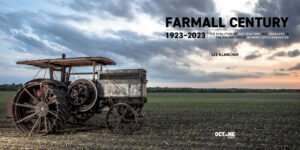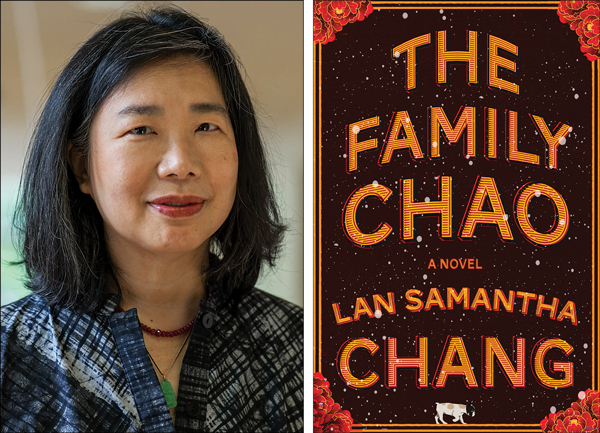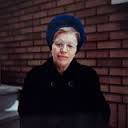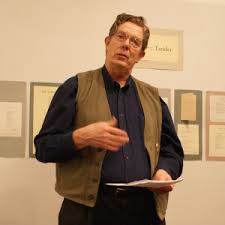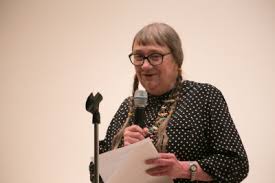Lee Klancher: The Farmall Century 1923-2023
April 24, 2024 by David
Filed under Art and Photography, Non-Fiction, WritersCast
 The Farmall Century 1923-2023: The Evolution of Red Tractors and Crawlers in the Golden Age of International Harvester – Lee Klancher – Octane Press – Hardcover – 9781642341393 – 384 pages (11.8 x 10.5) – $59.95 – October 26, 2023
The Farmall Century 1923-2023: The Evolution of Red Tractors and Crawlers in the Golden Age of International Harvester – Lee Klancher – Octane Press – Hardcover – 9781642341393 – 384 pages (11.8 x 10.5) – $59.95 – October 26, 2023
This fantastic coffee table book is a massive, well-researched, detailed, extensively illustrated, and very readable history not only of the International Harvester Farmall tractor, but of the people and company that built, marketed and sold it all over the world. Even if you have no interest whatsoever in tractors as motorized, wheeled devices, this story is compelling. Farming was once what the majority of Americans did for a living, and while the numbers of farmers has declined steadily during the last hundred years, the industries that emerged in the industrial age to convert American agriculture from horse to engine driven agriculture were a crucial part of the story of modern America and the world we fed (and still, to some measure still feed).
As a history of an important part of our agro-industrial economy, The Farmall Century is indispensable. If you are interested in American history, this book will captivate your imagination and make you think about the incredible ambition, ingenuity, inventiveness, and commitment of so many individuals who built these industrial companies, and you will also find reasons to think about the downsides of our industrialized agriculture too.
Lee Klancher probably knows more about tractors and farmers than anyone you will ever come across. He not only writes and takes photographs for his books, he is also the founder and operator of the leading tractor related book publisher, Octane Press, in Austin, Texas. I interviewed him about Octane for the Publishing Talks series back in 2016 because I think the kind of focused niche publishing he does is so interesting.
In any case, I love anything with wheels, and even though I did not grow up on a farm and have never driven a tractor, I had a great time reading Lee’s beautifully written and produced Farmall book. Talking to Lee about it was an additional pleasure. I hope you enjoy our conversation as much as I did. Here’s a link to the book, and here’s a link to Octane Press, which is a fun site to visit also. There are plenty of tractor books there, but much more too, a great many treats, especially if you like wheeled vehicles.
Podcast: Play in new window | Download
Lan Samantha Chang: The Family Chao (A Novel)
February 8, 2022 by David
Filed under Fiction, WritersCast
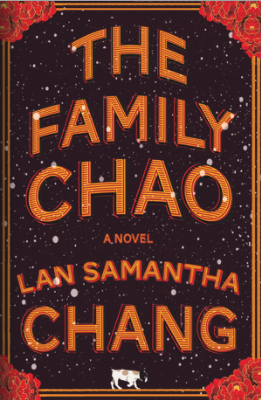 The Family Chao – Lan Samantha Chang – W.W. Norton – 9780393868074 – 320 pages – Hardcover – $29.00 – February 1, 2022. eBook versions available at lower prices.
The Family Chao – Lan Samantha Chang – W.W. Norton – 9780393868074 – 320 pages – Hardcover – $29.00 – February 1, 2022. eBook versions available at lower prices.
This is a beautifully written and thoughtfully composed novel about three brothers in a Chinese American family living somewhat awkwardly in a small town in Wisconsin. It has elements of the picaresque, the humorous and a great deal of sadness and pain that suffuses all.
At the heart of the novel are the three sons of the family patriarch, Leo Chao, who with his wife established and operated the Fine Chao restaurant in this small heartland community for over thirty years. The mother and father are almost mythological characters, he being the large appetite materialist and she being the spiritual – almost mystical – counterpoint to his outsized public persona.
When he dies, he is presumed to have been a murder victim by the residents of Haven, Wisconsin, and consequently unwanted attention is turned toward the brothers, each of whom has attempted to carve out an individual identity separate from their parents. Each of them is suspect in their formerly quiet community – Dagou, now the restaurant’s boisterous chef; Ming, financially successful but emotionally stunted; and James, the youngest, who is a dreamy college student not at all suited to the family tradition.
The book is a wonderful homage, well crafted by this very talented writer to The Brothers Karamazov. Each of the sons must struggle to understand and cope with what happened to his father, and one becomes the public scapegoat in the story. Chang is never heavy handed in her approach, and you don’t have to remember your Dostoyevsky to appreciate The Family Chao completely.
This is a complex and compelling story of what it is like to be an immigrant family in the heart of the heartland. It is also an American story, and very much a universal one at that. I enjoyed Chang’s writing and her storytelling, the many intriguing characters so finely portrayed, and the mystery in the novel that is unveiled unexpectedly that quite deftly ties together the entirety of the family Chao. Lan Samantha Chang is a terrific novelist and we had an equally terrific conversation about this book, her writing and her sense of the world at large.
Lan Samantha Chang is the Director of the Iowa Writers Workshop and Elizabeth M. Stanley Professor in the Arts at the University of Iowa. She is the author of a collection of short fiction and two novels and one book of nonfiction, All Is Forgotten, Nothing Is Lost. She has received creative writing fellowships from Stanford University, Princeton University, the Radcliffe Institute for Advanced Study, the Guggenheim Foundation, and the National Endowment for the Arts.
Podcast: Play in new window | Download
Publishing Talks: David Wilk interviews poet and editor Tom Montag
October 8, 2019 by David
Filed under Publishing History, PublishingTalks
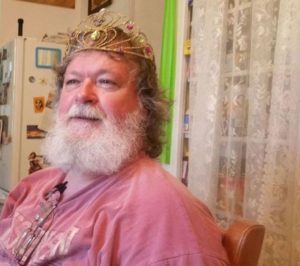 Publishing Talks began as a series of conversations with book industry professionals and others involved in media and technology, mostly talking about the future of publishing, books, and culture. As every media business continues to experience disruption and change, I’ve been talking with some of the people involved in our industry about how publishing might evolve as it is affected by technology and the larger context of culture and economics.
Publishing Talks began as a series of conversations with book industry professionals and others involved in media and technology, mostly talking about the future of publishing, books, and culture. As every media business continues to experience disruption and change, I’ve been talking with some of the people involved in our industry about how publishing might evolve as it is affected by technology and the larger context of culture and economics.
I’ve expanded this interview series to include conversations that go beyond the future of publishing. I’ve talked with editors and publishers who have been innovators and leaders in independent publishing in the past and the present, and will continue to explore the ebb and flow of writing, books, and publishing in all sorts of forms and formats, as change continues to be the one constant we can count on.
Tom Montag is a poet, critic, editor and publisher whom I have known for many years. I love his biography, which emphasizes his pure identity as a midwesterner. Unlike so many Americans, he has lived in the midwest for his entire life, and his work identifies deeply with where he lives. He does not need to declaim his role as a true poet of place.
Tom was somewhat famously the editor of Margins: A Review of Little Magazines and Small Press Books during the 1970s, was active in the Milwaukee literary scene, and was an editor and feature writer for Wisconsin’s Fox River Patriot during its heyday from 1977 to 1979. With his wife Mary, he edited and published the Wisconsin Poet’s Calendar from 1982 to 1984, which was subsequently handed to the Wisconsin Fellowship of Poets to continue.
Tom spent the better part of his work life at the family owned Ripon Community Printers in Ripon, Wisconsin. During those years, he wrote pithy sayings from a character he called Ben Zen. Four collections of the BZ poems were published between 1992 and 2000.
His memoir, Curlew: Home is about his first fourteen years spent on a farm outside Curlew, Iowa, and about his sense of loss in revisiting the community forty years later. Kissing Poetry’s Sister gathered eleven of Montag’s essays about writing and being a writer, including his long piece on creative nonfiction.
After he retired from his Ripon job, he spent five years creating “Vagabond in the Middle,” an attempt to determine what makes us middle western. He has been collecting stories from residents of twelve communities across the middle west, true stories of their families, their lives, and their connections to the places they inhabit.
Tom and I have worked together on publishing projects at Woodland Pattern in Milwaukee, and we’ve presented together there and at the Lorine Niedecker festival in Fort Atkinson, Wisconsin. Tom’s writing and editing has meant a great deal to me over the years, we are linked in so many ways, yet have such different backgrounds, and it was a great pleasure to speak to him here about his lifetime of work in writing and publishing, though to be sure, we barely scratched the surface of what we could have talked about.
SOMETIMES
Sometimes
in the weeds
a loveliness.
This moment
among all
the moments.
Rain when it’s
needed. Tom,
stop wanting
anything more.
MY FATHER,
holding the Y
of willow
lightly
in his hands,
walks the land.
The willow
leaps
for something
we do not
see: Here,
my father says
to the man,
drill here.
Tom is the author of many books and has edited anthologies as well. His most recent large scale collection is In This Place: Selected Poems 1982-2013.
There are two really good written interviews with Tom in the Wombwell Rainbow and the Mocking Heart Review. You can learn more about Tom and his work here and you can keep up with his prodigious output of poetry at his outstanding blog The Middle Westerner where you will regularly find him posting poems that will endure.
“Exploring the heart of the country; or, as Nancy Besonen has said, “Tom Montag is defining the character of the Midwest – one character at a time.”
Thanks Tom, for being who you are.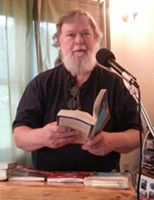
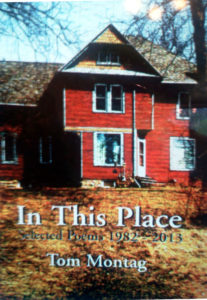
Podcast: Play in new window | Download
Peter Rock: The Night Swimmers (A Novel)
April 7, 2019 by David
Filed under Fiction, WritersCast
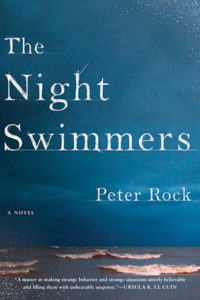 The Night Swimmers – A Novel – Peter Rock – ISBN 9781641290005 – Soho Press – Hardcover – 272 pages – $25.00 – March 12, 2019 – ebook versions available at lower prices.
The Night Swimmers – A Novel – Peter Rock – ISBN 9781641290005 – Soho Press – Hardcover – 272 pages – $25.00 – March 12, 2019 – ebook versions available at lower prices.
As I have said here before, one of the things I like best about doing the Writerscast interviews is that it’s introduced me to the work of many writers I would not have discovered on my own. The Night Swimmers is a perfect example. Peter Rock has been writing extremely fine fiction for many years, and yet I had never run across his work before, which still seems quite surprising to me, given the nature of his work.
Peter’s autobiographical novel captured my imagination from the outset. The writing is luminous and personal, dreamy, yet descriptive. His narrator is a young aspiring writer living temporarily in beautiful Door County in the northern reaches of Wisconsin’s Lake Michigan coastline. He’s bit lost, maybe stuck in his inability to see himself as an adult. He meets a young widow, Mrs. Abel, who is, like him, not exactly clear about herself and who she wants to be. She is older, attractive, smart and mysterious. The narrator finds himself swimming with Mrs. Abel at night without really knowing why, although there is a strong undercurrent of attraction between them, a tension that defines the essential mystery of their relationship, and the way they swim in the depths of the lake across large distances is similar to the ebb and flow of the narrator’s own life. And then Mrs. Abel disappears.
Some twenty years later, the narrator, who is now married, living in San Francisco and the father of two daughters, finds himself trying once again to understand what happened that summer, his psychic history rising to capture him like a deep lake current he used to swim in. He reads old letters and notebooks from the past, explores his relationship to a former lover, tries to understand through a sort of personal archeological expedition the world he once lived in and still cannot fully understand. Back in Door County once again, he tries to find out what happened to the elusive Mrs. Abel, and again he enters the deep lake waters to swim across the night.
Scattered throughout the book is the evidence of the narrator’s archeological exploration of his own history, pieces of paper, old emails, quotations from poets, and references to the extraordinary and strange psychic photographer Ted Serios. This book is a sort of literary pastiche that really could exist in multiple forms and formats, reflecting the author’s psychic imagination crossing over time and space through the medium of memory.
The Night Swimmers is a beautiful, complicated and challenging work of literary inspiration I found completely engaging. And it was a pleasure then, to have the opportunity to speak with Peter Rock about his fine novel.
“Peter Rock has written a weird and haunting story about a younger man and an older woman who like to swim in the dark. Happily The Night Swimmers is no male coming of age story. Instead their secret nightly practice in a dark and foreboding lake shimmers as a queer refusal for either of them to grow up right.”
—Eileen Myles, author of Afterglow
I recommend visiting Rock’s website, and follow the link to The Night Swimmers page, where there are some great visuals related to the book.
Peter Rock was born and raised in Salt Lake City. He is the author of several novels SPELLS, Klickitat, The Shelter Cycle, My Abandonment, The Bewildered, The Ambidextrist, Carnival Wolves and This Is the Place, as well as a story collection, The Unsettling. Rock attended Deep Springs College, received a BA in English from Yale University, and was a Wallace Stegner Fellow at Stanford University. He lives in Portland, Oregon, where he is a Professor in the English Department of Reed College. Leave No Trace, the film adaptation of My Abandonment, directed by Debra Granik, premiered at Sundance and Cannes and was released in 2018.
Podcast: Play in new window | Download
David Wilk talks with Anne Kingsbury and Karl Gartung about Woodland Pattern
May 11, 2015 by David
Filed under Publishing History, PublishingTalks
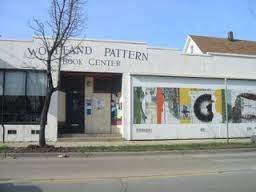 Publishing Talks began as a series of conversations with book industry professionals and others involved in media and technology about the future of publishing, books, and culture. As we continue to experience disruption and change in all media businesses, I’ve been talking with some of the people involved in our industry about how they believe publishing might evolve as our culture is affected by technology and the ebb and flow of civilization and economics.
Publishing Talks began as a series of conversations with book industry professionals and others involved in media and technology about the future of publishing, books, and culture. As we continue to experience disruption and change in all media businesses, I’ve been talking with some of the people involved in our industry about how they believe publishing might evolve as our culture is affected by technology and the ebb and flow of civilization and economics.
I’ve now expanded the series to include conversations that go beyond the future of publishing. I’ve spoken with editors and publishers who have been innovators and leaders in independent publishing in the past and into the present, and will continue to explore the ebb and flow of writing, books, and publishing in all sorts of forms and formats, as change continues to be the one constant we can count on.
It’s my hope that these conversations can help us understand the outlines of what is happening in book publishing and writing, and how we might ourselves interact with and influence the future of book publishing as it unfolds. This new interview reflects my interest in the history of independent literary publishing, an area in which I have been active for a long time. And this particular conversation reflects some longstanding personal relationships as well.
Woodland Pattern is a nonprofit literary arts center founded by artist Anne Kingsbury and poet Karl Gartung in 1979. It has been an incredible resource for readers and writers during all that time, committed to community and the arts in a way that may be unique in America. I’ve known Anne and Karl since before they started Woodland Pattern, and we have long shared many interests in writers and writing that we admire and are inspired by.
Anne and Karl chose the name for the place from a passage in (the extraordinary) Paul Metcalf’s wonderful and neglected book, Apalache, that describes the woodland culture of native Americans living south of Lake Superior – they had “pottery but not agriculture.” Karl and Anne’s extreme dedication, hard work, and commitment to their founding vision is at the heart of the institution, but of course over nearly 40 years, its work has been furthered by dozens of volunteers and now paid staff, as well as hundreds of writers and artists and of course thousands of supporters in its community.
The center houses a bookstore with over 25,000 independently published literary and arts titles otherwise unavailable in Milwaukee – or anywhere else it would seem. Woodland Pattern has always made inventory decisions for noncommercial reasons. As they say about themselves: “as booksellers and as presenters of art and literature, we want people to know that there is more than what you see at your chain book store, more than you are taught in school, more than what is reviewed in the papers. We hope to act as a catalyst, putting readers together with small press literature.”
Their space now also includes an art gallery where they present a wide range of exhibitions, artist talks, readings, experimental films, concerts and writing workshops for adults and children.
Anne Kingsbury is also an incredible artist whose work can be found in museums, galleries and private collections. She too is an American original. Karl Gartung is a poet who has worked full time as a truck driver (and union leader) for more than 35 years. His commitment to poetry lived in daily life is inspiring.
Woodland Pattern has also been a leader in promoting writers from Wisconsin, most notably, Lorine Niedecker, a Wisconsin native from nearby Fort Atkinson whose work, rooted and grown in that place through years of hard work, is finally being recognized as among the finest poetry of our era.
I am in awe of the work that has been accomplished over the past 35 years by Anne, Karl and everyone else at Woodland Pattern. They have made the acts of curation and presentation of art and literature in many forms into a lifelong effort. They engender and foster great art and connect living artists to communities of individuals, not as consumers, but as active participants in the work itself. This is brilliant, and should be celebrated for the depth and breadth of the work the organization has supported for so many years.
It was my great pleasure to speak with Anne and Karl about Woodland Pattern and their work and lives while they were visiting New York in spring 2015. As you can tell when you listen, this was a conversation among old friends with much shared history and common interests that I hope will inspire many of you to visit Woodland Pattern in Milwaukee (or at least their website here until you cam get there in person).
Woodland Pattern Book Center is a 501(c)(3) tax-exempt non-profit organization.
Here is their inspiring mission statement: “Our goals are to promote a lifetime practice of reading and writing, to provide a forum and resource center for writers/artists in our region, and to increase and diversify the audience for contemporary literature through innovative approaches to multi-arts programming.”
Podcast: Play in new window | Download
Margot Peters: Lorine Niedecker, A Poet’s Life
February 22, 2012 by David
Filed under Non-Fiction, Poetry, WritersCast
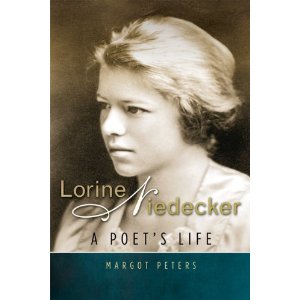 978-0299285005 – University of Wisconsin Press – Hardcover – $34.95
978-0299285005 – University of Wisconsin Press – Hardcover – $34.95
I have loved the poetry of Lorine Niedecker, and been deeply influenced by her work and life since being introduced to her writing by the great poet and independent literary publisher, Jonathan Williams, just a few years after her untimely death in 1970. His outstanding press, The Jargon Society, published one of the largest collections of her work during her all too brief lifetime (T & G: Collected Poems, 1970). In the years since her death, she has been discovered by many writers, scholars and general readers and her work is available now in several great collections, including Collected Works, edited by Jenny Penberthy, from the University of California Press.
For the many who still do not know of her, Lorine Niedecker (1903-1970) was born, raised, schooled and lived almost her entire life in Wisconsin. She was a poet her entire adult life, mostly self-educated, but always deeply involved in the milieu of modernist poetry and experimental writing. The most famous of her peers were William Carlos Williams (who knew and appreciated her writing), Louis Zukofsky (with whom she had a very deep and complicated relationship), and George Oppen and Carl Rakosi, among many others. But as a woman writer who worked hard for a living during a time when men ruled the literary roost, she wrote mostly in obscurity, known only to a small number of other writers who appreciated the brilliance of her imagination and craft.
My friend tree
I sawed you down
but I must attend
an older friend
the sun
Margot Peters’ new biography, Lorine Niedecker, A Poet’s Life, is a wonderful book, reflecting Peters’ own love and appreciation for her subject’s life and writing. Lorine’s life story is important to read about, whether you have read her poetry or not. It’s a powerful introduction to a complicated and unique American life. Lorine never had it easy. Her family life was difficult, her poor eyesight was a difficulty for her entire life, her relationships with men were complicated and often painful for her, and she never received the attention her writing deserved. Peters tells the story of her life in great detail, but is never boring. She interviewed people who knew Lorine where she lived in Wisconsin, and even those who, like me, think they know Lorine and her work will learn a great deal about her. Peters is perceptive and clear eyed about Lorine and aware of the difference between the life as lived and the poetry as written. For the poet, it is always the words that matter. Peters knows this too.
Reading about Lorine Niedecker continually reminded me of the power of her intellect and the depth of her brilliance as a poet. She honed and sharpened constantly, like a jeweler bringing a stone to life. Her reading was vast, her intelligence and clarity of vision virtually unmatched. I do not think it is an understatement to call Niedecker one of the greatest poets America has ever produced.
Poet’s work
Grandfather
advised me:
Learn a trade
I learned
to sit at desk
and condense
No layoff
from this
condensery
Every poet, every writer, should read and absorb these words.
If it’s not obvious, I have been smitten by this poet’s work for a really long time. This biography is a terrific addition to the Niedecker opus, and is highly recommended. I had a great time talking to Margot Peters, whose knowledge of Niedecker, Wisconsin and poetry is broad, deep and very well put together.
Please visit the Lorine Niedecker website to learn more about her, sample some poetry, and to get a feel for Fort Atkinson, where she lived most of her life. You can visit Margot Peters’ website for more about her book as well.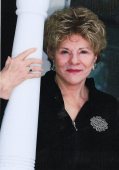 There is now an annual Niedecker Poetry Festival in Fort Atkinson, Wisconsin every fall.
There is now an annual Niedecker Poetry Festival in Fort Atkinson, Wisconsin every fall.
Books by and about Niedecker:
New Goose. Prairie City, Ill.: Press of James A. Decker, 1946.
My Friend Tree. Edinburgh: Wild Hawthorne Press, 1961.
North Central. London: Fulcrum Press, 1968.
T & G: Collected Poems 1936-1966. Penland, N.C.: Jargon Society, 1969.
My Life By Water: Collected Poems 1936-1968. London: Fulcrum Press, 1970.
Blue Chicory. Edited by Cid Corman, New Rochelle, N.Y.: The Elizabeth Press, 1976.
From This Condensery: The Complete Writings of Lorine Niedecker. Edited by Robert J. Bertholf, Jargon Society/Inland Book Company, 1985.
The Granite Pail: Selected Poems of Lorine Niedecker. Edited by Cid Corman, North Point Press, 1985.
Collected Works. Edited by Jenny Penberthy, Berkely: University of California Press, 2002.
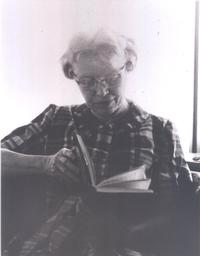 (note, I owe apologies to LN – in the poem Poet’s Work above, I could not get the spacing to work right here, please read it either on the Niedecker site or in the Collected Works to see it the way the poet meant it to look on the page)
(note, I owe apologies to LN – in the poem Poet’s Work above, I could not get the spacing to work right here, please read it either on the Niedecker site or in the Collected Works to see it the way the poet meant it to look on the page)
Podcast: Play in new window | Download
Dean Bakopoulos: My American Unhappiness
September 5, 2011 by David
Filed under Fiction, WritersCast
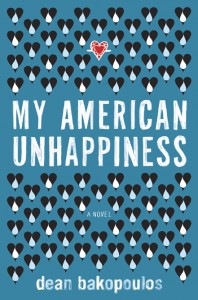 978-0151013449 – Houghton Mifflin Harcourt – Hardcover – $24.00 – ebook editions available
978-0151013449 – Houghton Mifflin Harcourt – Hardcover – $24.00 – ebook editions available
Dean Bakopoulos is a very funny and perceptive writer. My American Unhappiness, his second novel, takes place in Madison, Wisconsin during the period of the second Bush administration. Both the geographical and political backdrops are crucial elements of the story, whose main character is Zeke Pappas, a nebbish who runs a nonprofit called the Great Midwestern Humanities Initiative.
Zeke is an obsessive of some great measure. His life work has become the creation and maintenance of an “inventory of American Unhappiness,” a project that is a “byproduct of an overly cerebral loneliness.” He is also wildly naive and unrealistic, characteristics which in a certain way serve him well, as he is surrounded with problems in his life that would defeat the average person in short order.
Bakopoulos brilliantly balances the personal difficulties faced by Zeke with his involvement with some of the darker elements of the Bush era, including corrupt conservative politicians hiding the kind of personal behavior they legislate against in public, and the disconcerting pursuit of Zeke by a dark security-oriented governmental agency established after 9/11.
In some ways, the book could be read as just a zany midwestern comedy, but it’s clear that with Zeke Pappas’s story, Bakopoulos wants to tell us something important about 21st century American society. Zeke’s world is falling apart. His mother develops cancer, and decides to give her orphaned grandchildren (whom Zeke loves) to an aunt, unless Zeke can marry in time (impossible for him as he is simply too unrealistic about women). The government wants to audit the nonprofit he runs. Nothing works for Zeke. It’s a situation he feels he shares with the country as a whole, and Zeke knows it is the President that is the source of American unhappiness and ennui. Zeke sees Bush as “unencumbered by something as pervasive as unhappiness,” which makes him unfit to lead a country as complex and haunted as America. For Zeke Bush does not have the depth of spirit required to lead the nation.
Dean Bakopoulos is a writer to watch, a writer with great skills and who does have the depth of spirit required to portray the American scene through fiction. He is also a terrific writer to talk to about his work and gave me a great interview. You can visit his website to learn more about his work and ideas.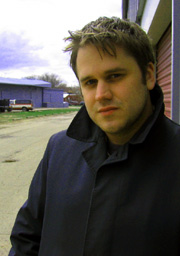 I am definitely looking forward to reading his next book.
I am definitely looking forward to reading his next book.
Podcast: Play in new window | Download


